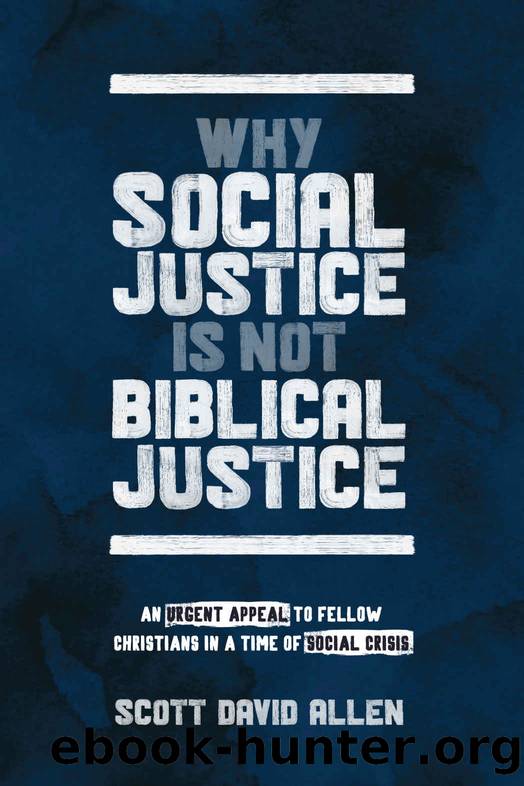Why Social Justice is Not Biblical Justice by Allen Scott D

Author:Allen, Scott D.
Language: eng
Format: epub
Publisher: Credo House Publishers
Published: 2020-09-10T00:00:00+00:00
Yes, the poor certainly can be victims. They can be victims of natural disasters, wars, violence, oppressive powers, or disease, and many face dire circumstances daily in our sin-scarred world. But our view of the poor (and their view of themselves) should never be reduced to âvictim.â This word can describe circumstances, but it must never describe identity.
The latter consigns poor people to utter helplessness and dependence on others. It ignores key characteristics that mark our humanity: freedom, agency, responsibility, and accountability. At different times and in different circumstances, we may have more or less freedom, but even in a prison cell, we are not utterly helpless. We can still make choices about what we think, how we treat others, and so on. We need not be completely dehumanized. Good can come even from the worst of circumstances.
Silas Burgess, for example, was brought in shackles on a slave ship to Charleston, South Carolina. Orphaned at age eight, Silas later escaped to Texas with other slaves via the Underground Railroad. Eventually he owned a 102-acre farm and started the first black church and first black elementary school in his town.
Silasâs great-great-grandson, Burgess Owens, is a former professional football player who is âan entrepreneur who has lived the American dreamâhaving received a world-class education, built businesses, raised a remarkable family and, unlike most white Americans, earned a Super Bowl ring.â14 He is anything but a victim, despite his family background.
The biblical worldview also asserts that the primary job of government is to uphold the rule of law, to restrain human evil by punishing lawbreakers, and to encourage virtue.15 It is not to equalize wealth. Doing so would necessarily violate the God-given rights and freedoms of the individual, particularly property rights established in the Ten Commandments.16 To equalize wealth, the government would necessarily have to take (or steal) from some in order to give to others, or it would have to assume that all wealth ultimately belongs to the government.
Human flourishing doesnât come from income equality, anyway. Coveting the wealth and circumstances of others is a violation of the Ten Commandments and leads to great unhappiness. As the Jewish Encyclopedia says, âThat covetousness is the cause of the individualâs discontent and unhappiness is certainly true.â17 True happiness is found in taking responsibility for my life and providing for the needs of others. This action affirms my human nature and dignity and leads to deep contentment.
Ideological social justice and biblical Christianity, as two distinct and irreconcilable worldviews, have two very different ways of âseeingâ poverty and impoverished people. These two sets of assumptions lead to two different approaches to working with the poor and two different outcomes. Tragically, in the name of social justice, many Christ-followers have mistakenly affirmed the first set of nonbiblical assumptions when they should champion the second. There are many things we can and must do to help the poor. But our actions ought to be based on biblical truths about the nature of human beings, wealth, and resources.18
Basing our
Download
This site does not store any files on its server. We only index and link to content provided by other sites. Please contact the content providers to delete copyright contents if any and email us, we'll remove relevant links or contents immediately.
The 5 Love Languages: The Secret to Love That Lasts by Gary Chapman(9770)
The Space Between by Michelle L. Teichman(6921)
Assassin’s Fate by Robin Hobb(6193)
Wiseguy by Nicholas Pileggi(5762)
Everything Happens for a Reason by Kate Bowler(4729)
Gerald's Game by Stephen King(4633)
Pillow Thoughts by Courtney Peppernell(4268)
A Simplified Life by Emily Ley(4155)
The Power of Positive Thinking by Norman Vincent Peale(4053)
Harry Potter and the Prisoner of Azkaban (Book 3) by J. K. Rowling(3346)
Resisting Happiness by Matthew Kelly(3332)
Girl, Wash Your Face by Rachel Hollis(3273)
Being Aware of Being Aware by Rupert Spira(3269)
The Code Book by Simon Singh(3168)
The Secret Power of Speaking God's Word by Joyce Meyer(3154)
More Language of Letting Go: 366 New Daily Meditations by Melody Beattie(3017)
Real Sex by Lauren F. Winner(3002)
Name Book, The: Over 10,000 Names--Their Meanings, Origins, and Spiritual Significance by Astoria Dorothy(2967)
The Holy Spirit by Billy Graham(2938)
